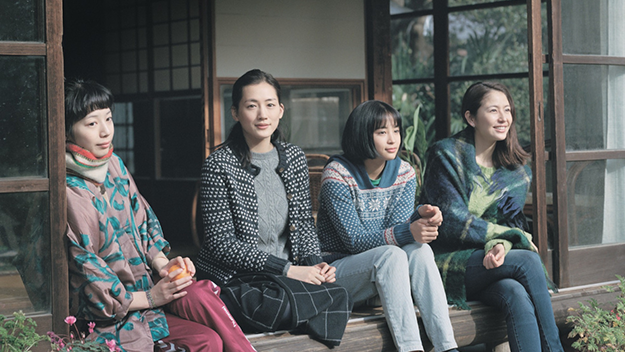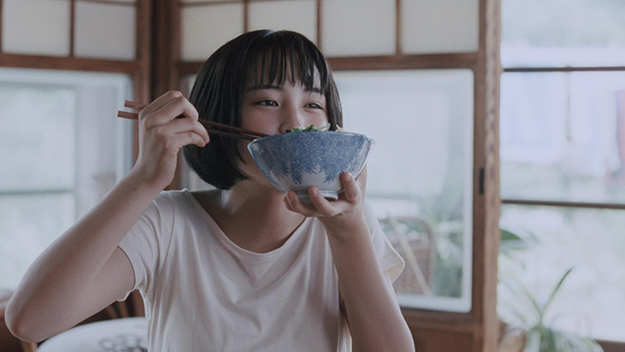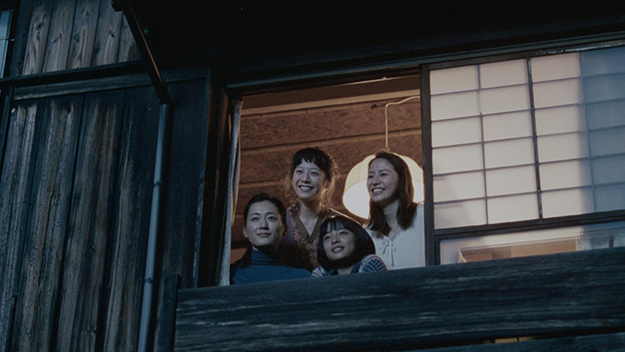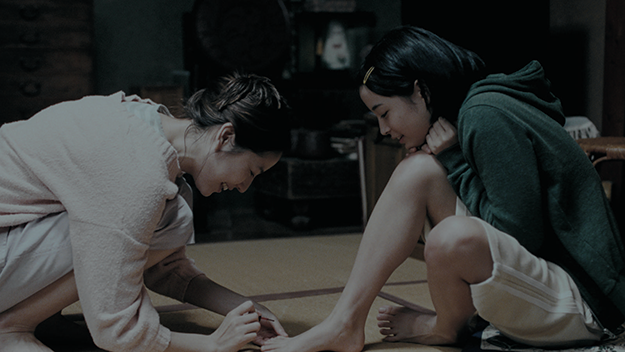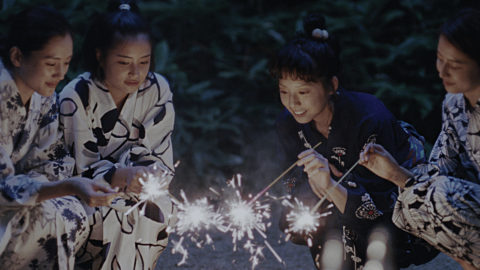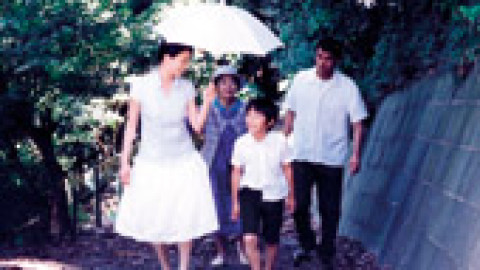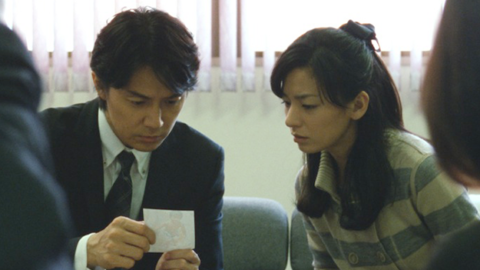Film of the Week: Our Little Sister
At a number of points in Hirokazu Kore-eda’s Our Little Sister, certain characters are described in the subtitles as “useless”—notably the heroines’ divorced parents and assorted boyfriends. I have no idea how closely that English word relates to the Japanese original, and if so, whether this says anything notable about Japanese social values. But there does seem to be a theme of utility, or lack of it, running through a film in which characters seem to want to be of use to the world around them. Sachi (Haruka Ayase), the oldest of the three adult Koda sisters, is a hospital nurse facing the challenge of running a new palliative care ward, while her younger sister Yoshino (Masami Nagasawa) is a bank clerk whose new job gives her an opportunity to go out into the world and directly help customers. As for Suzu (Suzu Hirose)—the new teenage half-sister that the Kodas suddenly acquire—she’s just a ray of sunshine who, despite her occasional naivety and awkwardness, seems to make everyone around her feel better about being alive. If that’s not useful, what is?
In drama, of course, useless characters invariably tend to be more interesting—as witness the divorced dad at the center of Kore-eda’s latest film, After the Storm, a gambler and failed novelist turned sheepishly corrupt divorce detective. And in Our Little Sister, supposed losers occasionally prove how useful they can be in adding pith to a film. One such is the sisters’ long absent mother (Shinobu Otake), who shows up in a flap for the first time in 14 years and instantly puts the cat among the pigeons, but gives the film a brief salutary charge of adult neurosis.
Kore-eda has long been one of Japan’s more exportable directors, his more recent films specializing in gentle, accessible but tightly controlled dramas of family discord. The days of detached, august Ozu-esque films such as Maborosi (95) are long gone, although a similarly contained melancholy marks my favorite among Kore-eda’s recent films, the more emotionally direct but nevertheless stately Still Walking (08).
Our Little Sister is probably Kore-eda’s softest work, but that may have a lot to do with its source—Umimachi Diary [Seaside Town Diary], a josei manga series by Akimi Yoshida that has been running since 2007. Josei is a female-targeted young adult genre of manga, and Yoshida’s series, as I understand it, is a slowly unfolding soap-style family narrative.
The setting is the coastal city of Kamakura, southwest of Tokyo—which happens to be where Yasujiro Ozu is buried—where the three Koda sisters share a house, their parents having long ago divorced and moved away separately. The oldest, Sachi, is the responsible and sometimes disapproving den mother, a highly motivated nurse who is having an unsatisfactory romance with a doctor, a married man. Yoshino has a habit of pairing up with unsuitable young men like her current squeeze, a ne’er-do-well with money problems; it’s suggested that this cynic finds having a girlfriend at the local bank about as useful as it gets. Then there’s Chika, played by the elfin, humorous-faced Kaho; she’s the fun-loving goofy one, an eccentric neo-hippie dresser who dates her colleague at a sportswear shop—an unsightly, Afro-haired guy who used to climb mountains and prides himself on having lost six toes on Everest.
When their father dies, the Kodas meet their 13-year-old half-sister Suzu, a shy, sweet-natured thing with bobbed hair, who—they surmise—has had a terrible time living with their father’s widow Yoko, and who did all the work of caring for him. The sisters invite her to come and live in their beautiful if cramped house which, they tell her, is like “a girls’ dormitory.” They’re not kidding—the atmosphere is like a perennial pajama party, with Kore-eda liberally laying on the signs of daffy girlishness. The siblings occasionally get into a flap over busy breakfasts (“Has anyone seen my moisturizer?”—“Is that my blouse you’re wearing?”), but the rest of the time do fun sisterly stuff, like giving each other pedicures, sharing fish curries, and above all, making the annual family wine from their plum tree.
You might expect that the infinitely sweet-natured Suzu will eventually turn out to be big trouble, but nothing of the sort. She’s instantly popular in school, a valued member of its football club, and she quickly earns the affection of the townsfolk of Kamakura—not least by joining in local traditions, like helping catch and fry whitebait. However, in the one scene that uncovers anything like a significant flaw, she reveals herself as gauchely priggish, saying her mother was a bad person for falling in love with a married man—failing to realize (although how could she?) that Sachi is in exactly the same position.
It’s perhaps his source material and its particular genre that make the film seem oddly mawkish by Kore-eda’s usual standards. Given his record, you would assume this to be an adult film about adult concerns—it did, after all, compete in Cannes last year—but on a stylistic level, at least, it seems partly to be playing to a younger audience, the readership of the original manga. Hence its playing up of immediate emotiveness both in its content and in a lush, assertively heart-lifting score by Yoko Kanno. Visually, the film easily flips into a register of youthful euphoria—as in the scene where Suzu is taken on a bike ride through a tunnel of white cherry blossoms as she tilts back her head in rapture. It’s no doubt also because of the manga series that certain, possibly familiar characters drop in and out, briefly giving hints of their biographies, but mainly passing through to give Suzu their blessing. Among them, a seafood café owner played by the character actor Lily Franky (he’s also seen in After the Storm and Kore-eda’s 2013 Like Father, Like Son) and best of all, livening up the film with her cantankerous presence, the doyenne Kirin Kiki as a testy but tender great aunt (she also steals the show in After the Storm and brought a dash of edge to Naomi Kawase’s otherwise insipid Sweet Bean).
Beneath its sugar-frosted quality, however, Our Little Sister has a singular character of its own. For a start, it depicts an almost entirely female world in which men play marginal roles and are little seen, if not invisible—none more invisible than the dead father. There are various boyfriends and admirers, but they barely play a part, the only prominent one being Sachi’s lover from the hospital; he has a couple of significant dialogues with her about their relationship, but he’s barely in the foreground, and certainly never gets to set foot in the closed space of the house that is the sisters’ private domain.
It’s also a curiously fragmented film that skips from brief episode to episode, and season to season, with cherry blossoms coming and going, visitors to town checking in and departing; written and edited by Kore-eda, the film is constructed in a gentle, seamless flow as if to signal that, whatever happens, life goes on and there will always be more plum wine next year. Given that the story is about three sisters (plus one), it’s hard not to think of Chekhov, what with the concentration on emotional states and lack of conventional event; that a local hangout is called “Seagull Café” may be a nod in this direction.
For all the sweetness, again, deep down the material is surprisingly somber. Here, essentially, is a story of three children abandoned by their parents, who grow up to shoulder their own responsibilities as surrogate parents. It’s a film about people messing up their lives, albeit in a rather mild, everyday manner, but who can’t stop blaming others, specifically their parents, for their pains and faults; and pain there is, in plenty. Even Suzu, who appears to exist in a state of permanent artless delight, eventually realizes that she’s a reminder to her relatives of how messed up their lives are. “Someone’s always hurting just because I exist,” she says—suggesting an existence that’s nothing less than living hell.
If you’re looking for the pain in this film, you have to look beneath the sunny surface, but it’s most tellingly readable in the flickering expressions of Haruka Ayase’s Sachi. Her contemplative reactions are immensely telling, an initially warm smile often dropping abruptly, turning to a frown of subliminally evoked anguish, all in microseconds. Ayase’s performance in particular gives a subtle edge of poignancy and emotional maturity to what often seems like benign soap material. One can justifiably prefer Kore-eda in a more solemn mood, as in Still Walking, but that doesn’t mean there isn’t seriousness here. At one point, pouring out the plum wine, one of the sisters tells Suzu she can have it sweet and mild, or strong and sour (Suzu commendably opts for the latter). Our Little Sister gives us its emotion sweet and mild—but savor it a little, and now and again the sour aftertaste emerges quite sharply.
Jonathan Romney is a contributing editor to FILM COMMENT and writes its Film of the Week column. He is a member of the London Film Critics Circle.



